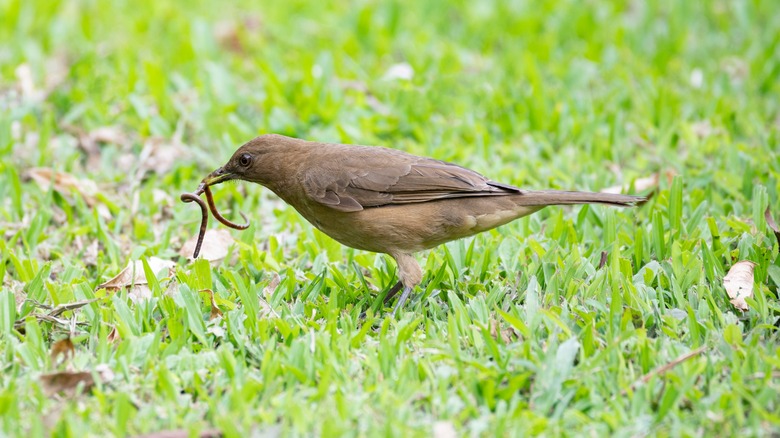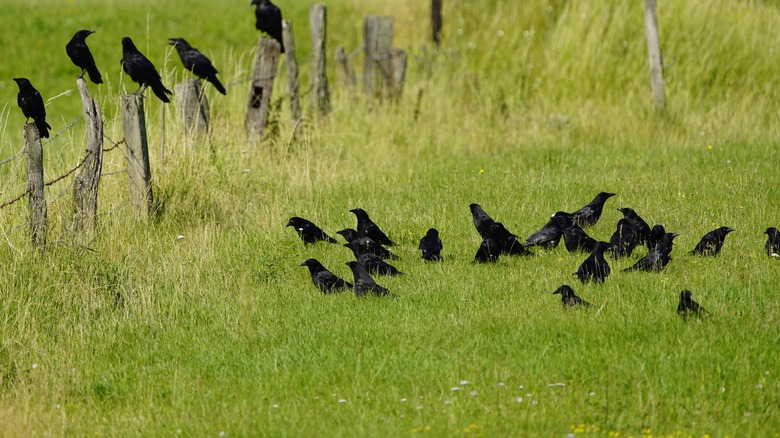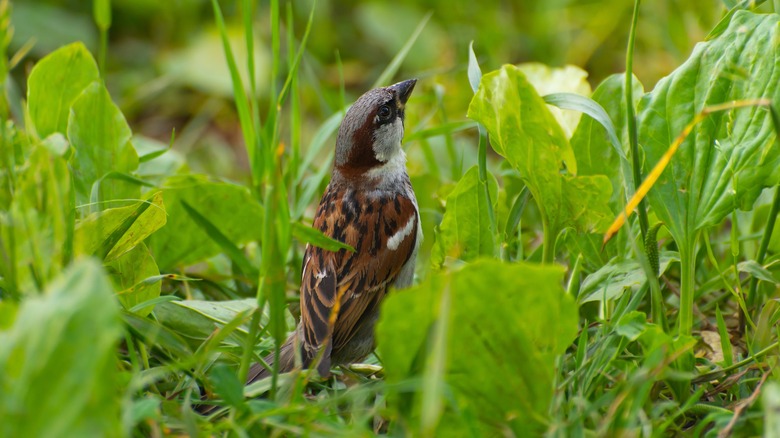Attracting Birds To Your Yard Might Be The Answer To Healthier Grass. Here's Why
As the snow begins to melt and the frigid winter turns into a blooming spring, birds seem to be everywhere. The one place you might not want them is usually where they are: your lawn. If you've seen small holes in the dirt and around your yard, they are most likely from birds. Many species of birds do this, most of which you have in your backyard. These include starlings, jays, robins, grackles, and sparrows. One of the main reasons birds dig holes in the grass is to search for food. These holes can be bothersome, especially with how much time and effort you put into making it look nice. Despite how it looks, this process actually helps improve the soil.
Many ground-feeding birds, like sparrows and thrushes, dig into the soil with their beaks to find food. This process creates small holes in the ground. As they scratch, dig, and peck, looking for food, they help aerate the soil, improving its structure. Aerating soil improves soil compaction, encouraging and allowing roots to grow stronger and deeper. Compacted soil does not allow water or air to penetrate deeply, leading to stressed plants, soil denitrification, decreased root growth, and plant loss. While it may seem like birds can cause damage to your yard, the insects they eat, including worms, grubs, and other bugs, can do more. Attracting birds to your yard may be the answer to healthier grass.
Why do birds make holes in the ground?
In addition to looking for tasty sources of food, birds also use these holes in the soil to dust bathe. Dust bathing is critical for bird health and cleaning their feathers. Using the dirt and dust from these holes, they fluff their wings to throw dirt onto their body, removing parasites, mites, and lice. Dust baths also help absorb excess oil from their bodies, weighing them down and diminishing their feather's insulation.
Certain species of birds also cache seeds. Known for their intelligence, those in the crow family, like ravens, jays, and magpies, will collect and store seeds in the ground, saving food for later. They use their long bills to create small holes in the ground, deposit the seeds, and cover them up. This food-storing behavior keeps food safe from other mammals and allows them to build up food reserves during difficult times.
How do birds help your lawn and garden?
Birds eat up to roughly 500 million insects each year, according to a paper published in The Nature of Science, including plant-damaging insects like aphids, grubs, caterpillars, beetles, and worms. By eating plant-destroying insects, birds can help reduce the chance of your garden and lawn being decimated by insects. Birds also help disperse seeds. As they dig and look for food, they unintentionally scatter seeds through their droppings. Birds can then increase the populations of grasses in your lawn, promoting a more diverse and healthier lawn. Bird droppings can also help fertilize. Their droppings are high in nitrogen, an essential nutrient for plant growth. Nitrogen is a central chlorophyll molecule and assists in plant growth and development. Nitrogen from bird droppings can help improve the soil and promote healthy grass.
Another great thing about birds, especially for your garden, is that they can act as a natural weed control. Birds like sparrows and finches eat pesky weed seeds before they even start sprouting. Attracting birds to your yard can mitigate the growth of weeds in both your lawn and garden. With less competition for nutrients and resources, birds can help you grow a more robust, healthier lawn.



